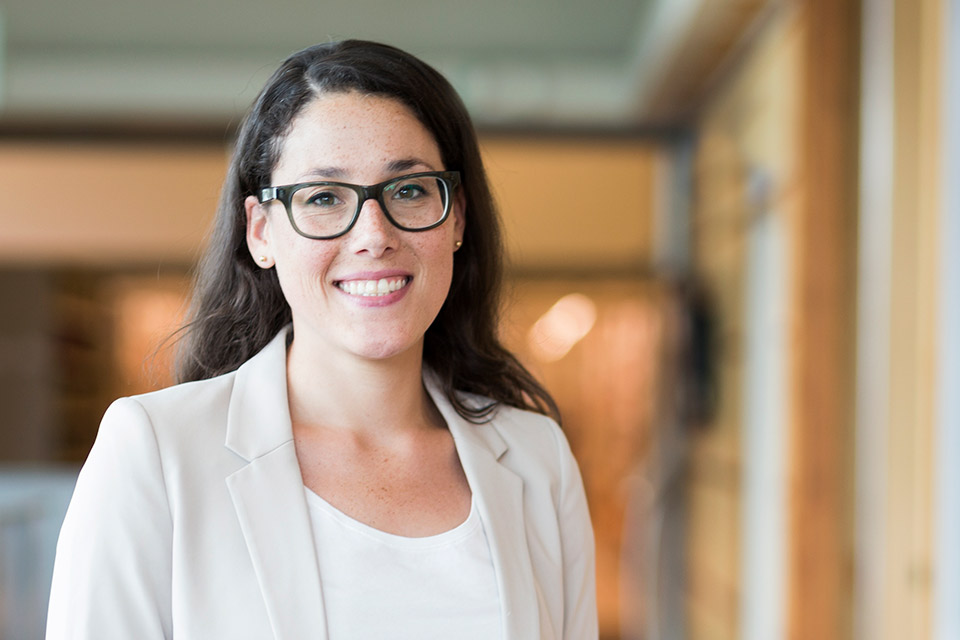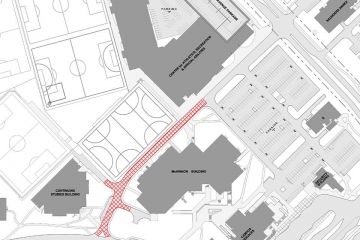Day in the Life: Shahira Khair
- Lisa Abram

UVic Libraries hold more than 2.1 million books, but that’s a drop in the bucket when compared to the explosion of electronic information available to students, researchers and the community. Some of the libraries’ electronic holdings would look familiar to readers from the university’s founding in 1963—books and journal articles served up on screens instead of paper. But new types of electronic resources are challenging universities and their libraries to rethink what acquisition, curation and discovery look like in the era of big data.
That’s where Shahira Khair comes in. In a newly created position as Data Curation Librarian, Khair develops services and expertise to better manage and support faculty and graduate students with their research data management needs.
With estimates from IBM stating more than 2.5 quintillion bytes of data are created on our planet every day, there is no question that data is powerful, and responsible management will play an important role in harnessing its potential.
Responding to the digital transformation of the research environment, researchers are expressing concerns about the need to ensure their research information is securely stored and accessible for future use.
Our evolving relationship with data revolves around more than research outcomes. From government and banking organizations to Hollywood studios and WikiLeaks, we’rebombarded by messages about the mismanagement or hacking of private information, coupled with social media giants capturing personal data from unaware subscribers.
According to Khair, the age of big data is immense in depth and continually growing in scope, characterized by its large volume, its complexity, and its vast potential to be mined for information. Not one to shy away from a challenge, she embraced the field of data curation in the infancy of her own academic work, and found her calling.
Khair first became interested in libraries as a graduate student working on her thesis research at the University of Ottawa. It was there, that she first collaborated with a science librarian to develop search strategies for finding open data.
“Through that initial connection with my librarian, there was a spark that went off in my mind about the immense role libraries play in the research process by describing and organizing information to make it discoverable and accessible.”
With history steeped in textual materials, libraries have a lot to offer the research community in the digital age; helping to manage research data to make it more findable, accessible and reusable, and promote its value as an important scholarly output.
With her background in science policy research, Khair believes that access to primary research data sources can help solve society’s most pressing issues—like the decline in biodiversity, land use pressures or climate change—as it is crucial for demonstrating change and evaluating our impact on the planet.
“It’s wonderful to be working at a research institution with a deep environment-focused research portfolio, and on a campus that prioritizes sustainability.”
On a recent collaboration with the UVic Mountain Legacy Project, she is supporting the team in implementing a long-term storage solution for their high-resolution photographic data. “The ability to leverage research data is critical for innovation and our ability to respond to society’s biggest challenges.” In fact, Khair emphasizes that primary data sources are the foundation for evidence-based decision-making and research-informed policy.
To derive maximum value from research, Khair explains that data need to be well-managed in terms of how they are organized, described, stored, shared and preserved, in order to make them accessible and reusable over time.
Her all-encompassing approach, not only includes the stakeholders of a given project, but she is mindful that other researchers may benefit from accessing data down the road. Evidence of Khair’s influence can be found at her previous place of employment, the Canadian Association of Research Libraries and the Portage Network, who are developing tools, such as the Data Management Plan Assistant, to help Canadian researchers meet the RDM challenges that lie ahead.
In making research results accessible and usable beyond a research team’s membership, Khair is helping to build a future where data preservation is key to a project’s impact and longevity.
Photos
In this story
Keywords: staff, library, technology, Day in the Life
People: Shahira Khair
Publication: The Ring




